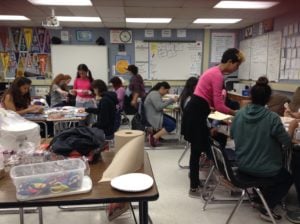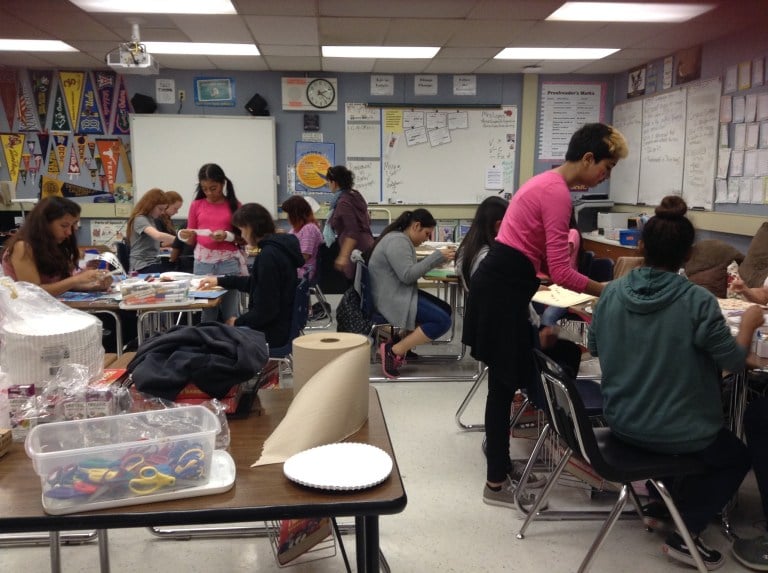The Society of Women Engineers (SWE) at Stanford will host a group of 30 middle school girls today with the mission of educating and empowering younger girls that science, technology, engineering and mathematics (STEM) fields are viable career options for people with a variety of backgrounds.

The middle school’s visit has been organized by SWE through a partnership with Techbridge Girls, a nonprofit that focuses on outreach to and inclusion of girls in STEM fields. One of Techbridge’s main forms of education involves after-school programs for elementary, middle and high school girls. These programs feature long-term and weekly programming in addition to annual field trips to organizations and campuses like Stanford for girls to meet and speak with role models.
Angela Umeh ’19, the middle school outreach officer of SWE, has been planning the event, which she says has become an annual tradition.
“On Friday, we’ll have a panel of SWE officers and members so that the girls can ask questions about what it’s like to be a woman in STEM and generally ask about the college experience,” Umeh said. “There’ll be smaller table talks following, so that the girls will feel comfortable asking a wide variety of questions that they might not feel as comfortable asking in a larger group.”
The day will also feature an activity emphasizing a mechanical engineering focus, pointing to the unit the girls are currently working on with Techbridge. The activity, called “Float a Boat,” will have the girls designing boats to hold as many passengers as possible.
The event’s conclusion will include a tour of campus and the Product Realization Lab (PRL).
“It’s a really great way for the girls to see engineering in action in an accessible and nontraditional sense,” Umeh said.
For Techbridge as an organization, the visit to Stanford is one of multiple field trips that help prevent younger girls from limiting their potential, according to Arazeli Castillo, program coordinator for the San Jose branch of Techbridge. Castillo runs three after school programs in San Jose and will be bringing her group from Ocala Middle School to Stanford.
“Our goals for our field trips at different sites are to get our girls exposed to possible career fields and getting them to imagine their place and different possible futures,” Castillo said. “I would like them to get out of this an idea of how these young women at Stanford decided to pursue these kinds of fields, what their first years on campus have been like, some of the struggles that they’ve had, some of the exciting things they’ve learned.”
The field trips of girls to different campus sites are part of a larger Role Models Matter initiative at Techbridge. Martha Pena, the organization’s senior program manager in the Bay Area, explained the initiative as a way to connect girls to role models such as Stanford SWE members who can share stories of their career paths in STEM, filled with times of success, struggle and perseverance.
The concept of Techbridge was built around stereotype threat research, investigating why women were reluctant going into STEM careers.
“[Our founder] discovered that it wasn’t a lack of interest but more that girls didn’t feel comfortable or empowered,” Pena said. “So an environment for girls to experiment and try out new things became a key component of the solution.”
Techbridge CEO Nikole Collins-Puri aims to build long-lasting, mutually beneficial relationships between the organization and institutions like Stanford.
“We want to keep building that relationship and that continuity so that our girls can see that an environment we expose our girls to somewhere they feel they might actually belong,” Collins-Puri said. “The institution knows that we are a selective partner to help them with their own pipeline goals. Our partners end up involved in multiple ways, whether through finding role models in campus visits or through funding or through involvement in research.”
Umeh noted that both the middle school girls and Stanford students involved in the visit have much to take away.
“There’s a lot of research suggesting that girls start to become disinterested in STEM around middle school,” Umeh explained. “Programs like this help to fight that so that later down the line, there are more qualified women in the pipeline for engineering jobs that improve diversity, which is one of SWE’s mission statements. For Stanford students, this is a rewarding way to give back to these middle schoolers. We can look back and reflect on all the knowledge we’ve acquired at Stanford to help girls that might one day like to be in our shoes.”
With partnerships and programming, Techbridge hopes to close the gender gap in STEM fields with confidence building and real world exposure. According to Collins-Puri, it’s about encouraging girls to be okay with failing and experimenting, celebrating mistakes that guide them along the way.
“What excites me about Techbridge is breaking cycles of poverty and lack of diversity and working to innovate within the challenges ahead of us,” Collins-Puri said. “We are really building the next innovators in STEM to change the world.”
Contact Susannah Meyer at smeyer7 ‘at’ stanford.edu.
